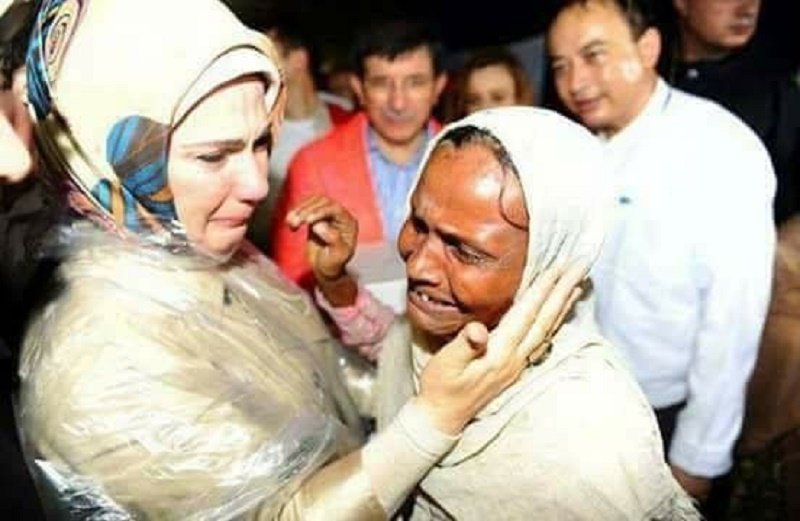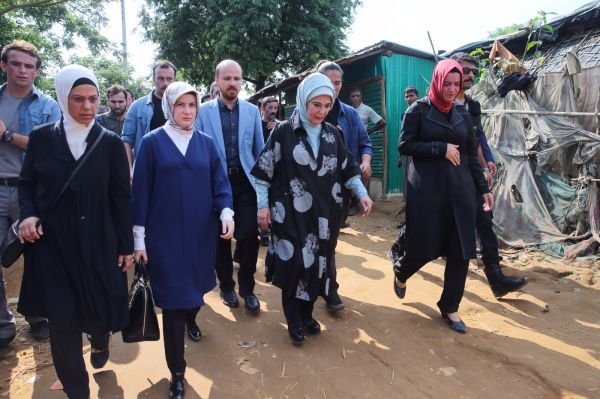
INTERVIEW
Turkey’s young MP and Chair for the Commission for Human Rights, Ravza Kavakçı shares her heart wrenching experience of being part of the fact-finding mission to Rohingya refugee camps in Bangladesh, and about her frustration with the international community in an exclusive interview
Maryam Ismail | Caravan Daily
TURKISH President, Recep Tayyip Erdoğan, during the Annual United Nations Assembly called on the participating nations to do more for the Rohingya Muslims. It seemed as if no one heard him. Even after two special sessions were held by President Erdoğan and his wife Emine, very few leaders showed up. The Turks have shown their commitment by sending a fact finding team and later on, a fundraising campaign so that the persecuted Rohingya Muslims can have some respite from their horrendous troubles.
Turkish Member of Parliament, Ravza Kavakçı the Vice President of Turkey’s ruling AK (Justice and Development) Party and representative for human rights, visited Cox’s Bazaar camp in Bangladesh. Clarion India spoke with Kavakçı about her visit and Turkey’s call for the international community to solve this unending crisis.
“The deadly violence that erupted between ethnic Arakanese Buddhists and Rohingya Muslims in early June 2012, in Burma’s Arakan state began as sectarian clashes in four townships. When violence resumed in October, it engulfed more than nine more townships and became a coordinated campaign to forcibly relocate or remove the state’s Muslims,” according to a report by Human Rights Watch. Whether you are from Afghanistan, Syria, Myanmar, or Iraq, those who have fled the bombs, bullets and chaos, all long to go back, because there is where they belong.
Children Without A Smile
Despite all the voiced concern for the Muslims of Rakhine, many in the international community seem satisfied with pointing fingers and throwing little cash at the problem, without
“Finding a political, economic, or social solution to this urgent crisis,” laments Kavakçı. Even now, during this hottest stage of the crisis, only the Turkish government has sent high ranking officials, to see for themselves the situation of the Myanmar Rohingya in Bangladeshi refugee camps. Kavakçı says that the committee also included the Turkish president’s son, Bilal Erdoğan, Turkish Foreign Minister, Mevlut Çavuşoğlu, and Fatma Betül Sayan Kaya, the minister of Family and Social Policy. Kavakçı adds of the many refugee camps she visited, those housing the Rohingyas, were like nothing she had seen before.
“The scenes broke my heart. This camp held mostly women, children, and elderly and what I saw there, I have never seen before,” narrates Ravza Kavakçı.

“I have been to a number of camps. From our own camps near the Turkish-Syrian border housing many Syrians of all ethnicities and religions to those along our other border with Iraq, but what I saw at the UN camp, which is a two-hour drive from Cox’s Bazaar is hard to explain. The scenes there broke my heart. This camp held mostly women, children, and elderly and what I saw there, I have never seen before. The condition was extremely awful. Not only were they living in make shift tents, but there was no infrastructure like in the other camps I have seen before, like those organized and funded by the Turkish Red Crescent, TIKA and other Turkish aid agencies.
“What struck me the most were the children there; to every camp I have been children normally play, it doesn’t matter much what the situation they are in, but here, the children looked as if their souls had been taken out. They had no emotions. It took me a long time to get them to smile,” she adds.

These People Are an Island
The forced exile and disenfranchisement of the Myanmar Rohingya Muslims has scary implications. If an entire people can be forced to leave their homeland this would mean that once the precedent is established, it could start a wave of entire peoples denied citizenship and then shown the door.
The excuses are that they are terrorists and accused of wanted to spread Islam all over the country. If this was the case, it would have happened a thousand years ago when Arab and Persian traders first brought Islam to eastern Myanmar, now called the Rakhine state, but it didn’t. And even when the Burmese King, was conquered by Nasr Al-Din in 1277, so it is very unlikely to happen now.
Even if some of those living in the area had come with the British in 1824 as some claim, a nearly two centuries in one place, the land should qualify anyone a citizen in any land. Not in the eyes of the Myanmar government which stripped the Rohingyas of their citizenship in 1982. This came as a result of 1974 coup, causing years of political strife which had nearly hundred ethnic groups vying for their place in the political and social landscape.
“There is no need to talk about democracy, if there is no right to live. The fundamental right of the Rohingya Muslims is the right to live. I am disappointed in the international community with their lack of consideration. If these nations are really concerned with human rights, then, they need to do something about it. When we look at the most basic right of citizens, it is the right to citizenship. Then all of a sudden, they were denied citizenship. Since, 1982, people have been running for their lives,” said Kavakçı.
Unacceptable War Crimes
Massacre, genocide and a holocaust. All of these awful adjectives are inadequate and describe the forced exile, attempted extermination, and murders that have been rained upon the Muslim population of the Rakhine province of Myanmar. The media reports are filled with crying women, skinny and powerless men, and children who have witnessed it all.
“While we were there, we saw horrific pictures of people who lost their limbs as they ran for their lives and in some cases, their lives because they had stepped on landmines that were planted along the border with Bangladesh by the Myanmar military. Also, heartbreaking were the stories of women living in the camps. As a woman, I find it difficult to describe what some of the women in the camp went through. One woman told us how she saw other women being raped by the Myanmar military. None of us had the courage to ask her what she went through as she spoke about others getting raped in front of her eyes. These are the war crimes against humanity, especially in terms of women’s rights; all of this is unacceptable.
“As human beings, we should be embarrassed that we are letting this happen. A few months ago, the crisis on the table was the Qatar situation and all of the nations were ready to act; then, nothing happened. Nobody cares. Yet, most world leaders only strongly condemn these atrocities, but what will this do? Of course Turkey will do whatever it can; give the humanitarian aid, providing food, clothing, and through our agencies and the Turkish people who themselves, gave money after they saw the plight of their brothers and sisters. Common people are coming forward to help and have set up a bank account so that funds can be collected.”
Now that they have your attention
“If this tragedy in Myanmar is not stopped, the history of humanity will have another dark stain,” Recep Tayyip Erdoğan
According to Kavakçı, it wasn’t until the Turkish government spoke about this plight of the Rohingyas, other nations started to making some moves towards helping them. However, these moves were very lukewarm. Some sent aid, but not much pressure was put on the Myanmar government.
“There are many forms of pressure that can be used against Myanmar, from economic sanctions to political pressure and even humanitarian pressure. I, as one, who fights for the human rights of other don’t really like withholding food and medicines and other humanitarian aid, but if it stops this problem, then, I am for it. So far the international community has only had sharp criticisms to offer and that just doesn’t help solve the crisis,” she says.

